From decoding the secrets of genetic engineering to exploring the mysterious world of whales and peering into the future of space-based telescopes, the 2024 Faculty of Science and Engineering Discover Lectures delivered unique insights into how science and engineering shape our future.
24 Jan 2025
Discover Lectures 2024: Nine fascinating public science talks
In 2024, the Faculty of Science and Engineering launched the Discover Lectures, a monthly public lecture series which ran from April to December and featured leading researchers from the faculty in fields ranging from nanotechnology and synthetic biology to astronomy and environmental science.
Nine distinguished speakers shared their expertise and passion for science with the public, giving an update on their own research and progress in their fields across three key themes: discover, create and innovate.
From exploring the tiniest particles in nanotechnology to uncovering the mysteries of the ancient Nile River, each lecture offered unique insights into how science and engineering are shaping our future.
The successful series will continue in 2025 with new speakers and topics. We'll shortly publish a link to register for the 2025 program.
Here's a brief overview of the 2024 Discover Lecture program:
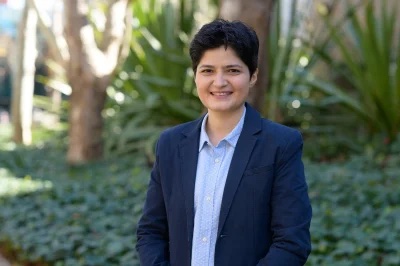
10 Apr 2024: Nanotechnology: The Next TINY Thing!
Associate Professor Noushin Nasiri, head of the NanoTech Laboratory at Macquarie’s School of Engineering, kicked off the series with an illuminating presentation on nanotechnology. A finalist in the 2023 Eureka Prize for Outstanding Early Career Researcher, Associate Professor Nasiri demonstrated how nano-sized sensors are revolutionising healthcare. During the lecture, which drew more than 150 attendees, she explained how in the world of nanotechnology, conventional rules of physics change dramatically – gravity becomes less significant and materials like gold can display a range of different colours. Associate Professor Nasiri also showed us some of the practical applications of nanosensors, including their ability to detect diabetes markers in human breath, identify pregnancy in cattle and monitor UV exposure to help in skin cancer prevention.
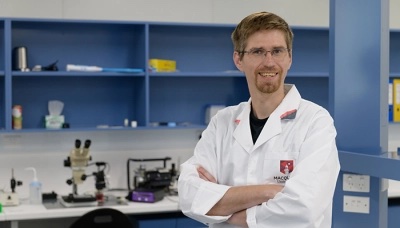
22 May 2024: Engineering a Sustainable Future with Animal Synthetic Biology
In the second Discover Lecture, Dr Maciej Maselko from Applied BioSciences presented new developments in synthetic biology and explored how genetic engineering is creating solutions that once seemed like science fiction. Dr Maselko's research focuses on transformative applications such as engineering the larvae of black soldier flies to convert food waste into industrial enzymes, and creating innovative strategies to combat disease-carrying mosquitoes. His presentation showed us how the merger of biology and innovation can generate practical solutions to some of humanity's most pressing challenges, from waste management to disease control.
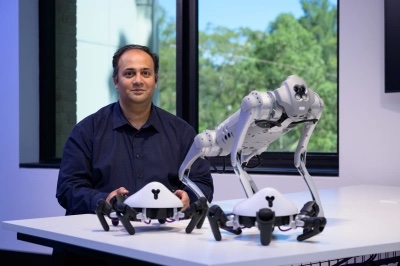
20 Jun 2024: The Internet of Things: What is it? Where is it heading next?
Dr Adnan Mahmood, Lecturer in computing, delivered an engaging presentation on the Internet of Things (IoT) and its future implications. The lecture explored how IoT technology is transforming daily life, from smart home devices to robots and urban infrastructure. Dr Mahmood, an accomplished author and researcher, provided hands-on demonstrations with various IoT and artificial intelligence devices. His presentation gave examples of how the seamless merger of physical and digital worlds through IoT and AI is already changing how we live, work, and interact, and gave us a glimpse into a smart, connected future where these devices are commonplace.
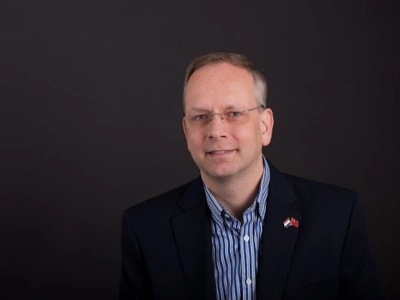
24 Jul 2024: From First Fleet to Harbour Bridge: Sydney's Astronomical Beginnings
Wednesday 24 July 2024, 6:00-7:15 PM
Professor Richard de Grijs took his audience on a fascinating historical journey tracing the astronomical heritage of Sydney through the story of William Dawes. The lecture explored Dawes' role as astronomer, engineer and surveyor from his arrival with the First Fleet in 1788 to his connection with the Sydney Harbour Bridge construction in 1932. Professor de Grijs, who holds positions as both a professor of astrophysics at Macquarie University and Executive Director of the International Space Science Institute-Beijing, revealed how Dawes established two observatories near Sydney's present-day city centre, seven decades before the construction of the historic Sydney Observatory.
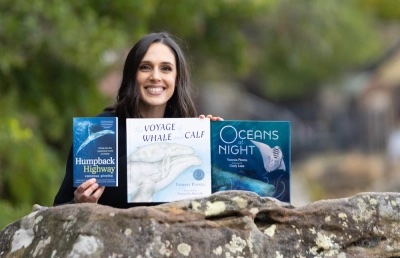
14 Aug 2024: Humpback Highway: Diving into the mysterious world of whales
Renowned wildlife scientist and author Dr Vanessa Pirotta, from the School of Natural Sciences, is a 2024 Eureka Prize finalist for her work in science communication. During National Science Week, Dr Pirotta presented an engaging exploration of whale migration along Australia's coastline. The popular lecture coincided with the release of her book, Humpback Highway, and provided insights into the annual journey of humpback whales from Antarctic feeding grounds to warmer breeding waters. Dr Pirotta discussed cutting-edge research on whale behaviour, including the significance of whale poo in marine ecosystems and the science of whale snot, making complex marine biology accessible and fascinating for all ages.
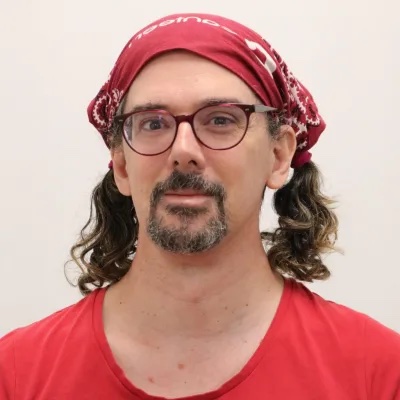
25 Sep 2024: Whose Life Will You Save? Design of Moral Choices in Video Games
Dr Malcolm Ryan, Course Director of the Game Design and Development program in the School of Computing, presented a creative overview of moral decision-making in video games. Dr Ryan explored how games uniquely position players to make consequential moral choices. The lecture demonstrated how theories of moral philosophy and psychology inform game design, creating more sophisticated and engaging experiences. Through interactive examples, including the fate of a character named Frankie, Dr Ryan illustrated how games can serve as powerful tools for exploring ethical decision making.
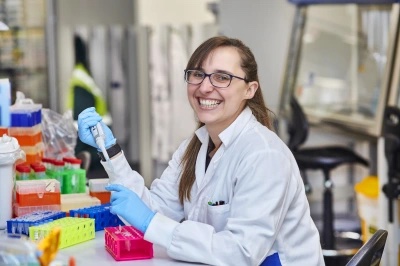
24 Oct 2024: Dough your research: A guide to synthetic yeast
Dr Paige Erpf, a synthetic biologist from the ARC Centre of Excellence in Synthetic Biology who also dabbles in science stand-up comedy, delivered an entertaining and informative lecture on the development of synthetic yeast. Dr Erpf explained how this common microorganism is being transformed from a traditional brewing and baking agent into an industrial powerhouse. Her presentation covered the historic creation of the first synthetic yeast and its applications in producing biofuels, medicines and sustainable materials to combat climate change.
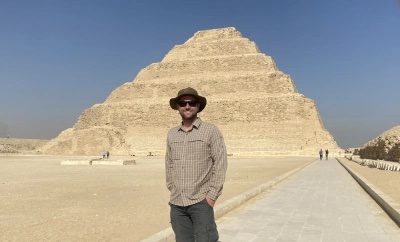
19 Nov 2024: Uncovering the ancient Nile
Associate Professor Tim Ralph presented his fascinating research which led to the discovery of a lost branch of the Nile River. Working with an international team of Egyptian scientists, Dr Ralph explained how he used methods including satellite remote sensing and sediment analysis to uncover the path of the ancient Ahramat Branch of the Nile. He explained how this watercourse once flowed past 31 known pyramids, providing new insights into the relationship between the river's movement and the location of ancient Egyptian monuments.
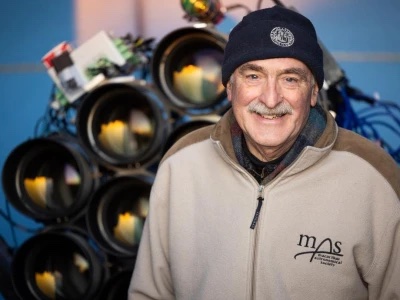
5 Dec 2024: Tomorrow's Universe – The Discoveries that will Change Science
The final lecture of the year drew the biggest audience of the series, with more than 200 people attending the prestigious Allison-Levick Lecture delivered by Professor Fred Watson, Australia’s former Astronomer-at-Large. Professor Watson's presentation explored the future of astronomical discovery, from the James Webb Space Telescope's revolutionary findings to upcoming projects that promise to transform our understanding of the universe. His engaging talk examined how new astronomical instruments will help to solve some of the universe's deepest mysteries, with particular attention to Australia's role in future research.
Professor Watson organised his talk around three themes: space and time fundamentals, state-of-the-art astronomy, and future discoveries that could revolutionise science. He discussed the important contributions of the Anglo-Australian Telescope, Australia’s potential role in the European Southern Observatory and great opportunities for radio telescopes in Australia. He explained how the limits of the speed of light means that astronomy allows us to look back in time, and showed examples of the interactions of time and distance on a cosmic scale, including images from the James Webb Space Telescope which revealed surprising galaxies from when the universe was 300 million years old, challenging current theories.
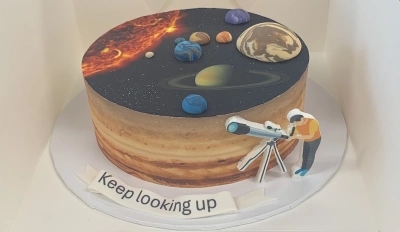
Professor Watson concluded by discussing the search for life beyond Earth, highlighting Europa, Jupiter's moon, as a promising candidate with its subsurface ocean. The Webb telescope and future instruments might detect signs of life in exoplanet atmospheres, potentially discovering life beyond Earth. And, as the lecture was held days out from Professor Watson’s 80th birthday, he was presented with a celebratory cake!
Find out more, and REGISTER HERE for the 2025 Discover Lecture Series.
**